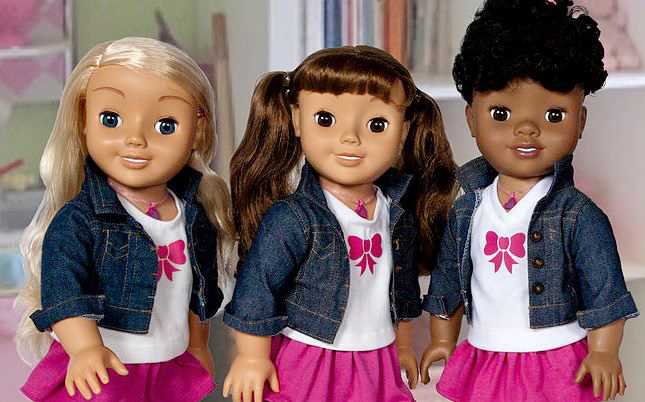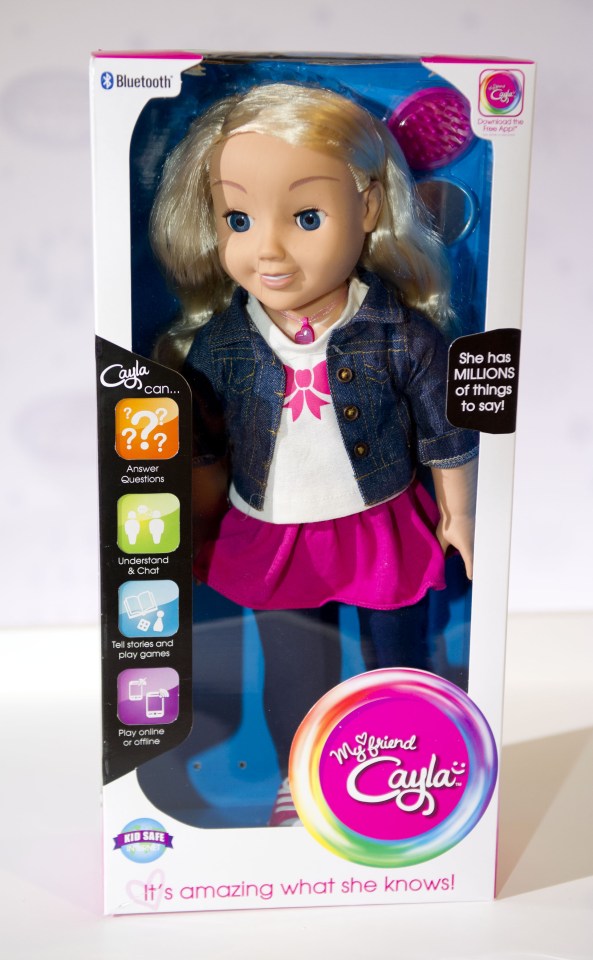Talking dolls ‘putting kids at risk from predators’ by ‘secretly recording their conversations’
'Smart' kids toys are reportedly collecting personal information from children, which can be easily hacked by strangers

TALKING toys could be putting your kids at risk by secretly recording their conversations and collecting personal information which could be stolen by dangerous predators.
Genesis Toys - who make the popular My Friend Cayla doll - and speech-recognition software maker Nuance Communications have been accused of using the toys to record conversations, which are then sent through the toy's app as audio files and transmitted to Nuance's servers.
The My Friend Cayla doll is sold in most UK toy shops and supermarkets, and is described as having "thousands of things to say and will also answer your questions". Kids are encouraged to talk to her and "discuss photos" with her both online and offline using Bluetooth.
But consumer watchdogs have accused the manufacturers of using the doll for covertly collecting data and passing it on, which flaunts privacy rules that state that kids younger than 13 need their parent's consent.
RELATED STORIES
The complaint also accuses Genesis Toys, who also make the i-Que Intelligent Robot, of failing to take proper security measures to ensure that unauthorised Bluetooth devices can't connect with them.
This means that dangerous predators and strangers could eavesdrop on conversations - which watchdogs say could put kids in danger of being stalked and harmed.
The complaint was filed to the US Federal Trade Commission by the Electronic Privacy Center (EPIC) and Campaign for a Commercial Free Childhood (CCFC) and is one of many across the world including complaints to European Union consumer watchdogs.
It states that "Both Genesis Toys and Nuance Communications unfairly and deceptively collect, use, and disclose audio files of children’s voices without providing adequate notice or obtaining verified parental consent" and as a result "creates a substantial risk of harm because children may be subject to predatory stalking or physical danger."
Director of the EPIC Privacy Project Claire T. Gartland said: “Genesis and Nuance are completely disregarding their legal and ethical obligations when it comes to kids’ privacy.
“Instead, they have chosen to exploit children’s sensitive voice recordings and private conversations for corporate profit.
"It is extremely alarming that what a child says to her ‘trusted’ friend could end up in a voice biometrics database sold to law enforcement and intelligence agencies.
“With the growing Internet of Things, American consumers face unprecedented levels of surveillance in their most private spaces, and young children are uniquely vulnerable to these invasive practices.
“The FTC has an obligation here to step in and safeguard the privacy of young children against toys that spy and companies that exploit their very voices for corporate gain.”
CCFC Commercial Director Josh Golin added: "Children form friendships with dolls and toys with ‘personalities,’ and confide intimate details about their lives with them.
“It is critical that the sensitive data collected by these toys be subject to the most stringent protections and not be used for manipulative and sneaky marketing.”
Kids are also being subject to advertising in the My Friend Cayla doll - which, according to researchers, has been pre-programmed with dozens of phrases in reference to Disneyworld and Disney films.
But the product placement is not disclosed to users because kids are too young to understand that it is a form of advertising.
'Smart toys' are part of the 'Internet of Toys' - a phrase used to describe digital toys which use WiFi, Bluetooth or mobile apps.
Many of them offer 'smart' features such as cameras, microphones and sensors that can record and respond to kids' interactions and the industry is worth billions of pounds each year.
Kathryn Montgomery, a US Professor of Communication, said: "“Children today are growing up immersed in a digital world, where mobile devices, games, apps, and now a new generation of Internet-toys are profoundly shaping their social interactions, personal experiences, and behaviours.
"Regulators need to ensure that children will be able to reap the benefits of these digital technologies without being subjected to harmful practices that undermine their privacy, safety, and wellbeing."
We pay for your stories! Do you have a story for The Sun Online news team? Email us at tips@the-sun.co.uk or call 0207 782 4368














